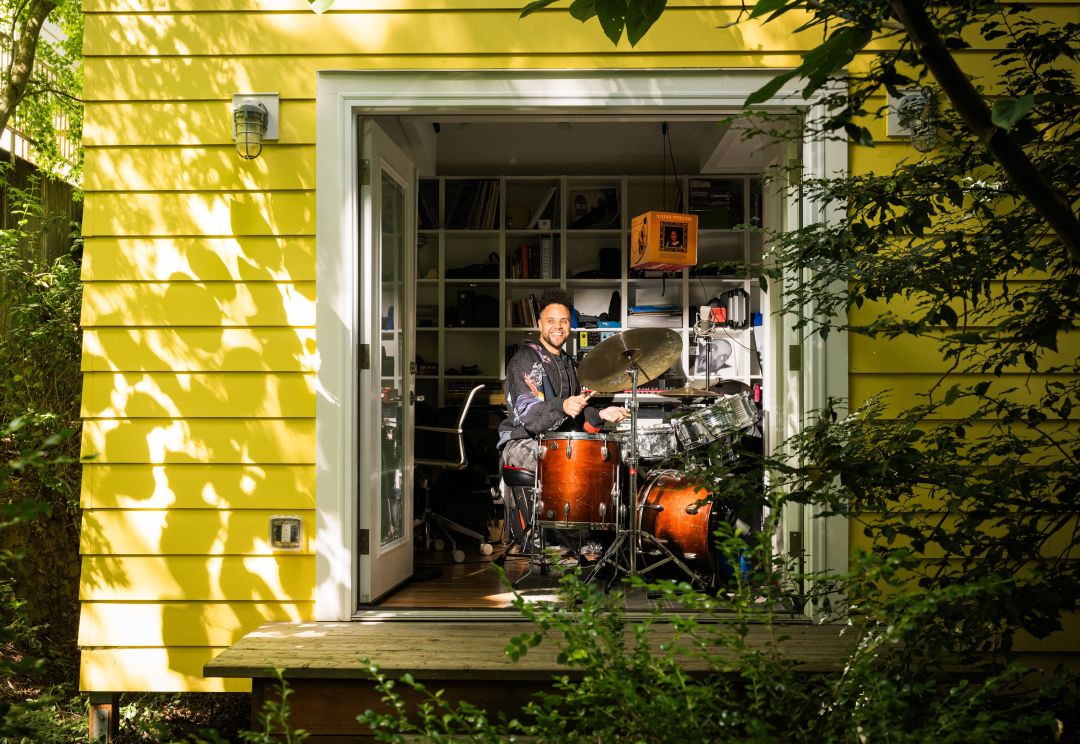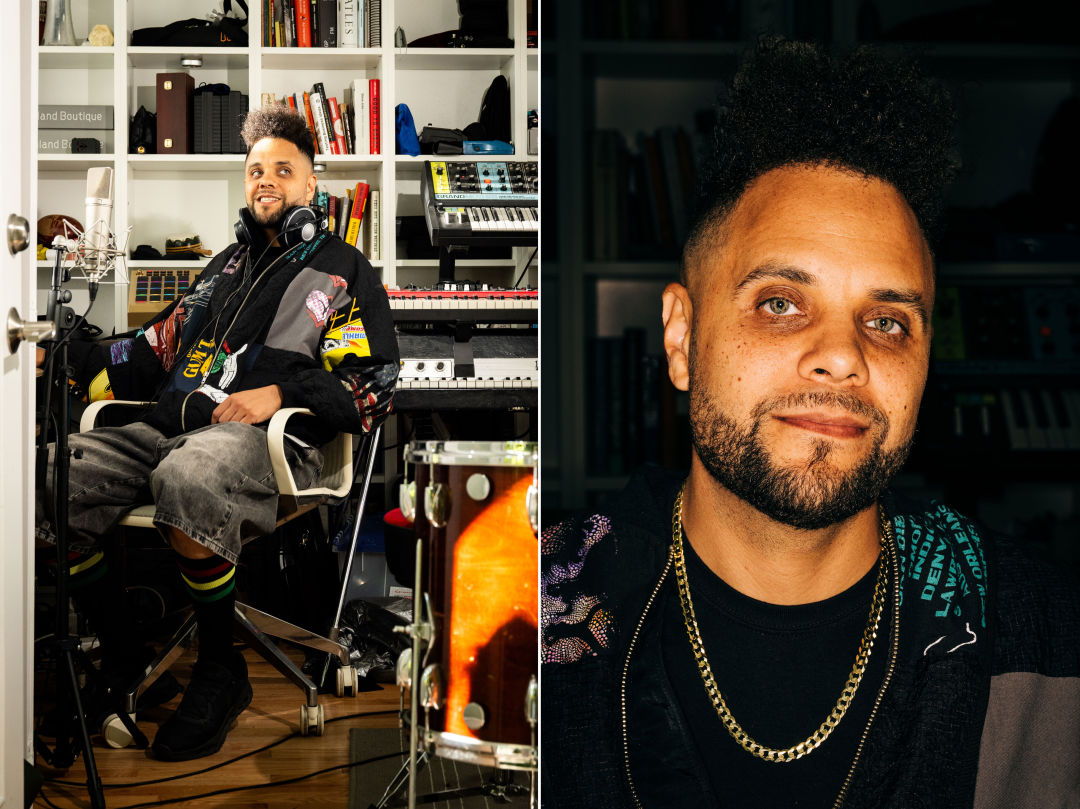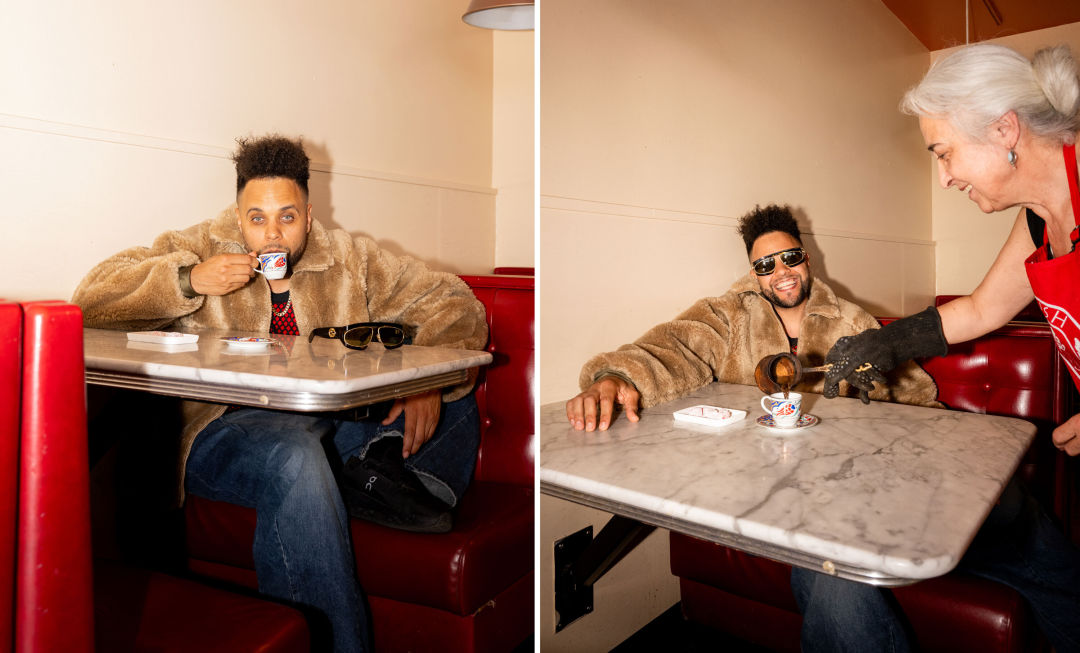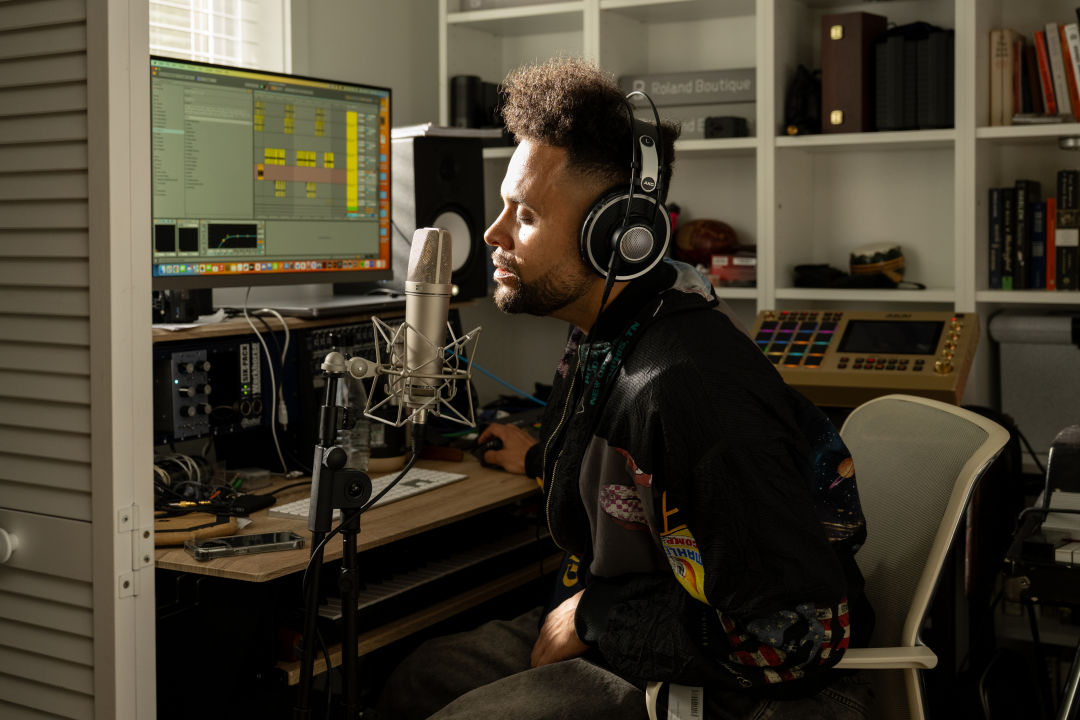Kassa Overall Is Back in Seattle and Back in the Flow

Image: Chona Kasinger
The night before Kassa Overall welcomed me to his Queen Anne home for an interview, he decided to tidy up his backyard music studio. Given how many instruments are crammed in there—drums, synthesizers, rack-mount effects, packed tighter than a Thanksgiving fridge—this was easier said than done. It didn’t matter, because Overall failed to make a dent. He reports that instead of cleaning the space, he sat down, “made a sound,” and lost himself.

Image: Chona Kasinger
“I swear I was like, I’m not gonna work tonight,” says Overall. “I could just tell, I’m gonna waste my time and be tired tomorrow. But then I came up with this little line, and next thing you know, I kept going. Now I got a whole song.”
This is part of being an artist: optimizing yourself as a conduit for inspiration. Knowing how and when to put in the time, and properly yielding that time when the impulse arrives. “With a song,” says Overall, “the hardest thing to do is find that one thing that makes it dope. One line, or one chorus, or one drum pocket. Once you’ve got that, you’re done.”
If you’re nearing that “one thing,” chores become skippable.

Image: chona Kasinger
At 42, Overall, a Grammy-nominated drummer and producer and graduate of Garfield High School, has worked his way into the prime of a critically acclaimed musical career that, with each subsequent release, feels increasingly him. This year he was named one of six recipients for the prestigious Doris Duke Award, which comes with $525,000 in unrestricted funds over seven years.
In person, Overall’s easygoing disposition belies the arduous facts of his journey. After studying percussion at the Oberlin Conservatory of Music, he moved to New York in 2006 and gigged his way into full-on artistic crisis. “I got into this space where I wasn’t enjoying performing,” he says. “Like, I have to play [for rent money] but I’m losing the love for this.” Overall came home to Seattle and put his gear in storage. “I had to ask myself, do you really want to do this? You don’t have to do this, right? Let’s try out not doing it, see what that feels like. And that was hard, too.”

Image: Chona Kasinger
Nearing his nadir, Overall got a call from famed pianist Geri Allen, wondering if he’d drum in her band during some upcoming shows at the Village Vanguard in New York—perhaps the most iconic venue in all of jazz. “I was about to tell her no,” says Overall. “I had to look at myself in the mirror, and look at the absurdity of what I was trying to say. One of the greatest piano players in the world wants me to come play at the mecca, this place I’ve wanted to play my whole life. It’s like, get yourself together. You depressed? Go for a run, bro. Go get a massage. You gotta do this gig.”
Overall did the gig. He wound up staying in New York for 15 years, drumming for, among others, Yoko Ono, the bassist Christian McBride, and the pianist Jon Batiste on The Late Show with Stephen Colbert. He moved back to Seattle “by accident” at the height of the pandemic, which brought him to yet another crisis, albeit one shared by many performing artists. Now, says Overall, “Where my career is at, in terms of playing and touring, I don’t need to be in New York. I think I have more ability to practice and work here.”

Image: chona Kasinger
Overall and I are sitting down one month before the release of his fourth studio album, CREAM, a jazzified collection of seven hip-hop covers and one jazz standard, “Freedom Jazz Dance.” (Keyword: freedom.) CREAM scrambles the entire concept of genre, subverting expectations of both rap and jazz while highlighting the terrific groupthink of Overall’s band. The listening public will know these tunes—“Big Poppa” by the Notorious B.I.G., “Nuthin’ but a ‘G’ Thang” by Dr. Dre, the Wu-Tang title track—but they won’t have heard them with a flute playing the melody, or John Coltrane saxophone innuendos over the bridge, or Overall carrying on like his drumming idol Elvin Jones on the kit.
The songs themselves aren’t Overall’s, but the arrangements are, and CREAM is a faithful distillation of his musical identity. Growing up in Seattle in the ’90s and early aughts, Overall was introduced to avant-garde jazz through his father and folk guitar through his mother, both musicians. He became a regular on the Northwest jazz circuit as a teenager. “But most of my friends weren’t into that,” he says. “It was kind of corny to them. They were into rap. I felt so divided, you know?”

Image: Chona Kasinger
Of jazz and rap, Overall says, “They’re so close to each other. And at the time they were so far away.” He remembers this period as “a bit of a double life,” with one foot—the high school popularity foot, we’ll call it—in rap, and the other in “being a musical intellectual, nerding out.” CREAM pokes fun at that whole experience. “Just because the outside world divides something in some kind of way,” says Overall, “doesn’t mean you have to.”
A full studio album of hip-hop covers wasn’t in the long-term plans, but his take on Snoop Dogg’s “Drop It Like It’s Hot” made waves, and his partner Lauren Du Graf (herself a recent Grammy nominee, for writing Alice Coltrane liner notes) had the idea. The band was already playing rap covers during shows and had at least half an album’s worth of material. Overall rounded out the track list, did some furious arranging, and made three separate trips to Brooklyn Recording. Voilà! CREAM. Overall takes the album on tour this fall, with 18 US shows (including one at Hidden Hall October 25), three nights in Tokyo, and seven European stops including Prague, Rotterdam, and Milan.

Image: Chona Kasinger
There are plenty of standalone rap covers played in a jazz style, but not many full albums. For Overall, what began as “a quick little thing” turned into a sophisticated LP in the style of midcentury recording engineer Rudy Van Gelder, whose instinctual use of studio dynamics remains the genre’s paragon. The snowballing artistic process was a bit like the previous night, when Overall tinkered up an idea and wound up writing and recording a full demo. Reflecting on this tendency, he laughs and says, “I guess I can’t really do anything halfway.” This is a good thing. His fans wouldn’t want him to.




